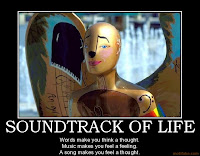The Best Soundtrack for Life Or Your Money Back

A Facebook friend and fellow Orthodox blogger is running an FB experiment. Each day he is posting a separate song that is part of his soundtrack for life. My guess is that much of this is tongue in cheek, but it is fascinating. This is something I could never do. For me, it would be like getting a tattoo; as soon as I made my decision public, I would be embarrassed by its level of uncool. Growing up in an age of tv, radio, & movies, most of us probably have songs that evoke deep memories. My soundtrack would be a strange mix of brit pop, movie soundtracks, 80's/90's CCM, early rap, and a college foray into grunge. I still hear "Eye of the Tiger" in my head whenever I motivate myself to start a running regimen every 3 years. Decades after hearing a song, I am amazed that I can still remember the words.
Songs do have power. They have a way of entering the heart of man through the back door. The music, rhythm, and rhyme drop the rational defenses of the mind and touch that intuitive part of us where we know but do not know how. Songs create and sustain memories. Familiar phrases and chords stir up past events so they become present to us once again. Throughout human culture, man has used songs to pass on their cultural identity and tradition. Israel was no exception. The Psalter and much of the OT are hymns and songs capturing the essence of their experience of God. Once set to music this tradition is delivered into the heart and moved forward to future generations.
Somewhere in the life of the church, hymns were lifted from the pages of Scripture to create a soundtrack for the Church. The Psalter has always been sung and continues to this day, but 9 separate songs were chosen that express the Church's encounter with the Holy Trinity. These songs process chronologically from Moses to the priest Zacharias (the father of John the Baptist), and were codified in a liturgical form called the canon.
 The 9 odes create a form that allows the liturgical poet to weave a topic through each song. It is in the 6th century under the pen of such saints as Sts Romanos, Andrew of Crete, and John of Damascus that the form flourishes. I would guess that the nine had been accepted and prayed as a separate group for some time prior, yet any info that readers may have on their origins would be helpful.
The 9 odes create a form that allows the liturgical poet to weave a topic through each song. It is in the 6th century under the pen of such saints as Sts Romanos, Andrew of Crete, and John of Damascus that the form flourishes. I would guess that the nine had been accepted and prayed as a separate group for some time prior, yet any info that readers may have on their origins would be helpful.Several years ago, we discussed each ode in our Sunday School class. Over the next couple months I will summarize the content of each ode and show how the Church uses them to communicate the gospel and the path into the kingdom of God.
Each of us have songs that generate memories and feeling. These 9 should become part our own soundtrack and shape our hearts and actions for eternity.
Comments